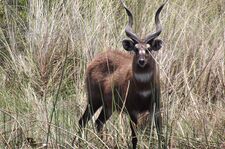Qeqsaraken antelope
| Qeqsaraken antelope | |
|---|---|

| |
| Scientific classification | |
| Kingdom: | |
| Phylum: | |
| Class: | |
| Order: | |
| Family: | |
| Subfamily: | |
| Genus: | |
| Species: | T. namijanus
|
| Binomial name | |
| Tragelaphus namijanus Uanax, 1883
| |
The Qeqsaraken antelope (Tragelaphus namijanus) is a species of antelope endemic to eastern Trellin. It is mainly found in the provinces of Namija and southern Ja'ekha, and is named for the Qeqsaraken, a vast wetland region on the Hanoth river.
Taxonomy
The scientific name of the Qeqsaraken antelope, Tragelaphus namijanus, was first proposed by Velaran naturalist Tévos Uanax, who described the species in his tour of the lands around the Sea of Velar in 1880-83. In 1901, Kinira Ymnikam published a book in which he moved the species into the genus Limnotragus, and this proposal gained some traction before being put down by Uanax and his disciples at King's College, Parthenope.
Description
Like most other species of antelope, the Qeqsaraken antelope shows considerable sexual dimorphism, with males reaching a height of 94–132 cm (37–52 in) at the shoulder compared to females' 77–93 cm (33–37 in). Additionally, only the male possesses horns, which grow 50–100 cm (20–39 in) long. It also exhibits distinct environmental adaptations for its swampland habitat,
including a water-resistant coat and splayed hooves that give it better footing.
Habitat and distribution
The Qeqsaraken antelope primarily inhabits areas of lush grassland with an adequate supply of fresh water. For this reason its distribution centres around the Hanoth river. It is most commonly found in the Qeksaraken marshland, where its specific adaptations give it a significant advantage over other antelope species. A herd animal, they tend to stay together in groups of four to ten individuals. Its home range is usually between 10 and 16 km2 in area.
